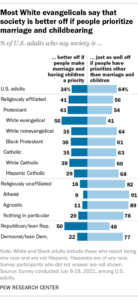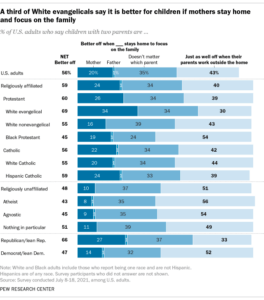Among all Americans, white evangelicals are most likely to say that prioritizing marriage and having children is better for society, but in real life they are not more likely to be married than other Christians — and previous studies have documented higher divorce rates among evangelicals.
The “sanctity of marriage” has been standard appeal of evangelicalism for decades, giving rise to entire genres of conferences, books and sermons. The most notable example is the success of James Dobson’s “Focus on the Family” empire, which is built around promoting two-parent families and clearly defined gender roles.
New data from Pew Research finds that the evangelical quest to prioritize marriage has not saturated the general culture — and not even the evangelical culture.
 White evangelicals are the only religious subgroup in which a majority (56%) said prioritizing marriage and having children is better for society than other options. That compares to about a third of U.S. adults (34%) who said society is better off if people make it a priority to get married and have children, while almost twice as many Americans (64%) believe society is just as well off if people have priorities other than marriage and children.
White evangelicals are the only religious subgroup in which a majority (56%) said prioritizing marriage and having children is better for society than other options. That compares to about a third of U.S. adults (34%) who said society is better off if people make it a priority to get married and have children, while almost twice as many Americans (64%) believe society is just as well off if people have priorities other than marriage and children.
A primary difference previously noted among white evangelicals compared to the general population is that they tend to marry younger.
Still, Pew researchers noted that white evangelicals “consistently hold more traditional views than others, including other Christians,” on questions of marriage and family. People with no religious identity tend to have the most progressive stances.
But the gap between evangelical views and the views of the general population are not as gaping as might be anticipated. While white evangelicals are considerably more likely than others to prioritize marriage and raising children, still four out of 10 said this is not the most essential priority.
And the views of white evangelicals versus the views of all Americans with a religious affiliation aren’t terribly apart. There’s only a 15-point difference between white evangelicals and all religious Americans who say it’s OK for people to have priorities other than marriage and children.
The views of all religious Americans lean much more strongly toward prioritizing marriage and children than the views of self-described atheists, Pew found. Among atheists, 91% said society fares just as well when people have priorities other than marriage and children. That compares to 63% of Catholics and 64% of white Protestants who do not identify as evangelical.
Also notable is that only one-third of Catholics prioritized marriage and child-rearing amid a religious culture also known as strongly advocating marriage and children and preaching against abortion.
Also notable is that only one-third of Catholics prioritized marriage and child-rearing.
Again, strength of religious commitment appears to play a role in Americans’ opinions on these questions. Pew found that “highly religious people,” meaning “those who say religion is very important in their lives and those who attend religious services regularly,” are most likely to say society is better off if people prioritize marriage and childbearing.
Some segments of evangelical Christianity are well-known for advocating that, when possible, mothers of young children should stay home to care for them while husbands go to work outside the home. Not surprisingly, white evangelicals were the most likely (69%) to say children with two parents are better off when one parent stays home.
 However, these same white evangelicals are evenly split on the question of whether it is best for mothers to stay home to care for children versus saying it does not matter which parent stays home.
However, these same white evangelicals are evenly split on the question of whether it is best for mothers to stay home to care for children versus saying it does not matter which parent stays home.
A majority of all adults (56%) said children with two parents are better off when one parent stays home — an economic reality not accessible to most American families. Currently, only one in five American parents with children in the household stay home, a figure Pew said “has been consistent for at least three decades.”
Input for this survey was collected in July 2021 but was not released by Pew until December 2021.
Related articles:
Support for interracial marriage has grown from 4% to 94%
More adults than ever are unpartnered in their prime years, new research shows


